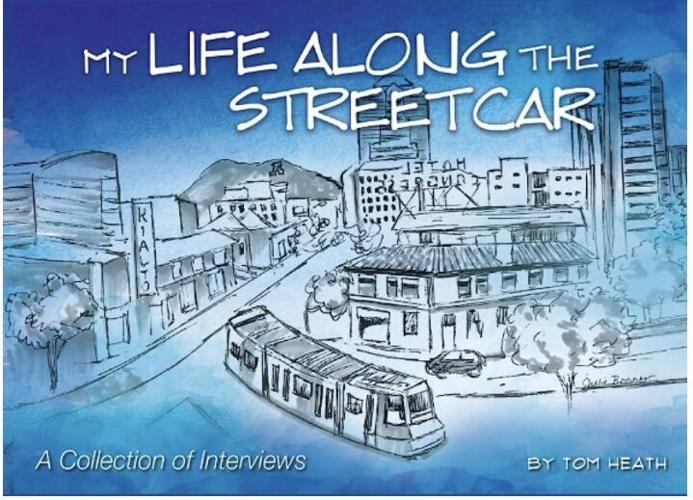It is never too surprising when someone from somewhere else succumbs to the subtle charms of Tucson. Less than half of us, after all, were born here. We’ve moved to the desert from all over the world, but here is a story you don’t hear very often.
Tom Heath discovered Tucson after living for 20 years in … Tucson!
“Embarrassing,” Heath laughed, with a shake of his head. “We lived on the east side, near Wilmot and Broadway, and it never crossed my mind to go downtown and explore. What’s weird is that when I travel, I love downtowns. I walk the streets. I get to know the place. But I never did that here.”
Let the record show he has made up for a lot of lost time.
Heath now lives in Armory Park, hosts a local talk show on radio, co-owns a downtown gallery, and is the author of a new book about Tucson. Published independently late last year, “My Life Along the Streetcar” is a collection of interviews, snapshots of local businesses and flashbacks from Old Pueblo history.
People are also reading…
Did you know the outline of the USS Arizona on the UA Mall just barely fits the available space, with less than an inch to spare? Or that the name of the Bawker Bawker Cider House on Fourth Avenue is a nod to the owner’s chickens?
Such nuggets are sprinkled throughout Heath’s book, but they are only appetizers.
The entrées are the conversations with people who are quietly shaping life in the downtown area today.
Rick Collins and April Bourie walk us through the Presidio. We visit Mission Garden, the Food Conspiracy Co-Op, Imago Dei Middle School, some of the shops along Fourth Avenue and Main Gate Square.
Brightly designed and fully illustrated, “My Life Along the Streetcar” is a fun addition to the “Tucson” shelf in your family room bookcase.
Heath’s own story begins in 2015, when taking part in a Second Saturday celebration downtown. Chatting with friends, he learned about Presidio San Agustín del Tucson – and the cannon that is fired each month during Living History Days.
“I remember thinking, ‘Wait, they fire a cannon … every month … one block down from the county courthouse? How on earth don’t I know about this?!’”
So it began, this curiosity about his “new” hometown.
Soon, Heath saw that cannon at work in the Presidio. From there, he began walking the Turquoise Trail. He sampled downtown restaurants and attended downtown events.
“After a while, I found myself downtown all the time,” Heath said, and two years later, he began sharing his discoveries with listeners of 99.1 FM KTDT, “Downtown Radio.”
“The concept we talked about, initially, was doing 30-minute, in-studio interviews each week with people who were doing things downtown,” Heath said. “As we talked, though, the boundaries seemed a little vague. What is ‘downtown?’ Eventually, seeing how much was happening around the new streetcar, we decided that would be our footprint. The streetcar went from A Mountain to the university, so we did, too.”
“Life Along the Streetcar” still airs every Sunday from 11 to 11:30 a.m. and it was the show that led to Heath’s book.
“We were on the radio, we were doing social media, we thought a book would give us one more way to tell the story,” Heath recalled. “Our plan was to publish some of the interviews we’d done on the show. We had all the transcripts. I’d always wanted to do a book. I thought it would be easy.”
Well, “easy” became three years of trial, error, revisions and re-shoots. Luckily, the pandemic lockdowns gave Heath, photographer James Portis and editor Elizabeth Weiford time to sort it all out.
“Right away I realized that if you read a transcription, sentences break in random places … grammar is often wrong … things that sound perfectly normal in conversation just don’t on a printed page.”
The solution: The book offers edited excerpts of interviews that readers can hear in full by using the QR code that accompanies each one.
There were other challenges, to be sure, but the book finally went to the printer last summer and was released in the fall. It is now available for $20 on Amazon and can be found at Mission Garden, 946 W. Mission Lane; the Presidio, 196 N. Court Ave.; and Heath’s Tucson Gallery, 300 E. Congress Street.
Sales have exceeded expectations, Heath said, but that was never a high priority.
“I’ve probably given away more than I’ve sold,” he said. “I just want people to see what took me 20 years to see, that we live in an amazing place that has something for everybody. I was pulled in by a cannon, but for some people it might be food, gardening, a school for kids in poverty or a battleship. No matter what your passion is, chances are you can find it right here.”
FOOTNOTES
Good news, Tucson: There is a new independent bookstore in town. Stacks Book Club opened earlier this month in the Oro Valley Marketplace, near North Oracle and West Tangerine roads. Even better news: the space includes a café and bakery. Stacks is open from 7 a.m. to 8 p.m. every day.
Ready, set, read! The Sealey Challenge, a monthlong readathon created by poet Nicole Sealey, will begin Aug. 1. The challenge: read one book of poetry every day, all month long. It is being co-hosted this year by the UA Poetry Center, which will be open Tuesdays through Saturdays, 9 a.m. to 5 p.m. Learn more at poetry.arizona.edu.
Attention, Jillian Cantor fans: The Tucson author’s next book, “The Fiction Writer,” will be released both in hardback and paperback Nov. 28. Spoiler alert: it’s not a memoir.
The Mission Garden Project is run by the non-profit, Friends of Tucson's Birthplace. Located west of downtown, it features Sonoran Desert-adapted fruit orchards and vegetable gardens interpreting 4,000 years of agriculture in Tucson. Video by: Mamta Popat / Arizona Daily Star
Browse previous Bookmarks columns and keep up with news from the Tucson book community by following Bookmarks Arizona (@BookArizona) on Twitter.


















